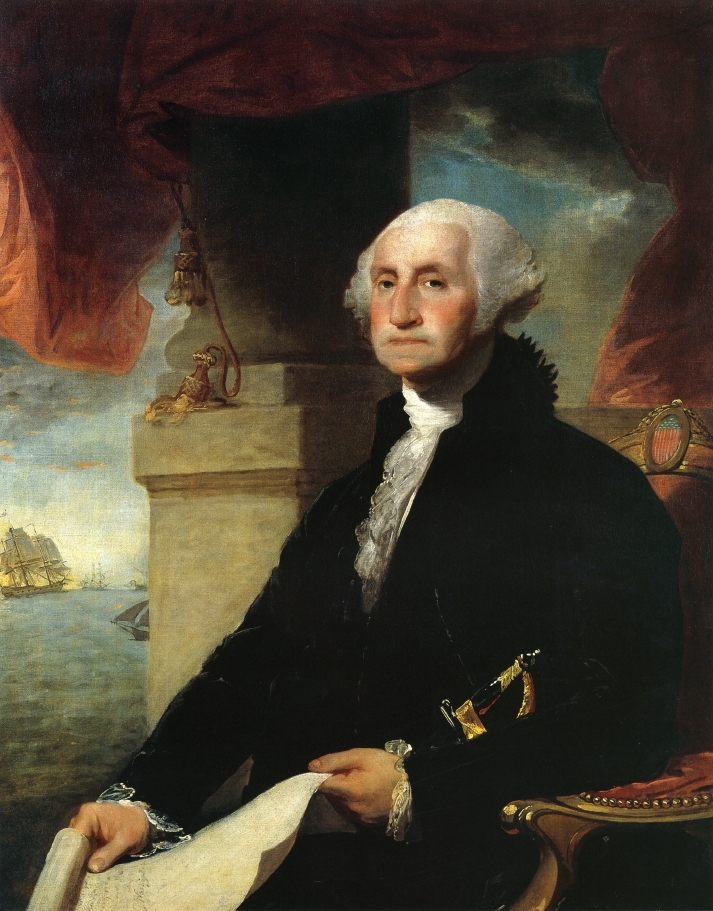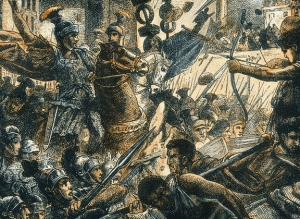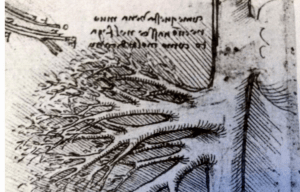“I feel my self going. I thank you for your attention. You had better not take any more trouble about me; but let me go off quietly; I cannot last long.”1 These were George Washington’s dying words. Who could have imagined that this great Revolutionary War hero and first President could fall two years after his retirement? He seemed to be immortal in the public’s eyes. Staying in the spotlight for nearly twenty five years, standing as the symbol of American nationhood, he not only had stood as a symbol of America, but he had also commanded the armies that helped gain national independence. After all the wars, he never appeared fazed, never showed any type of weakness or vulnerability, until that frigid winter of 1799.2
The century was nearly over, and the future of the young nation seemed bright. The former commander-in-chief of the nation had retired to his estate of Mount Vernon and had set out on horseback to check on certain areas of his plantation. It was December 12, 1799.3 He was exposed to cold rain and snow, but that did not stop this man from carrying out his responsibilities. However, sometimes carrying out responsibilities can have serious consequences. The next day he woke early in the morning, having difficulty breathing. Later in the morning he started to developed pain in the throat, and this led him to be unable to swallow or speak well. He grasped for some air, constantly tossing and turning to find a comfortable position.4 Lying down in agony, he was surrounded by three physicians who were all at a loss as to what to do.
James Craik, Gustavus Richard Brown, and Elisha Cullen Dick were the attending physicians for Washington, and all knew him very well.5 The first to arrive was Dr. Craik on Friday, December 13, when Washington started first experiencing a cold with a light hoarseness. By 2 a.m. the next morning, he awoke with troubled breathing. At 6 a.m. he was showing signs of a fever with throat pain and respiratory suffering.6 Washington was unable to swallow and even had difficulty speaking. Dr. Craik believed that the only option for Washington was for a bloodletting.
Bloodletting is the surgical removal of blood from a patient, and it was a typical procedure physicians used in the eighteenth century. Typically, the physicians were not the ones that would carry out the bloodletting; they would call in a skilled bloodletter. In this case, the bloodletter was George Rawlins. At 7:30 a.m., Rawlins removed about 12 to 14 ounces of Washington’s blood. Washington actually requested an additional bloodletting. Two hours later, Dr. Craik applied a blister of cantharides to Washington’s throat and removed roughly 18 more ounces of blood. This was also done at 11 a.m.7 Washington was still alert at this time. He even had the strength to stand up and walk to the bathroom, but he still had trouble swallowing tea, nearly suffocating from the attempt and unable to cough up the fluid.
There was an argument among the physicians caring for Washington, whether there should be a fourth bloodletting. Dr. Elisha Cullen Dick believed that more bloodletting would make Washington’s condition worse. Nevertheless, Dr. Craik ordered for the bloodletting at 3 p.m.8 After the fourth bloodletting, Washington seemed to show improvement; he was able to swallow. With renewed strength, Washington was able to revise his will. He knew his time was coming to an end. As the night continued, his condition steadily worsened. The physicians tried their best to keep him stable by applying blisters of cantharides to his arms, legs, and feet. They even applied wheat-bran cataplasms to his throat.9 This did stop his condition from worsening.

At 10 p.m., Washington whispered his burial instructions to his aide. Twenty minutes later, George Washington died. The news of his death spread rapidly across the country. The grieving was not only at his at burial site, but across the Atlantic. There was a London newspaper that eulogized: “His fame, bounded by no country, will be confined to no age.”10 Units of the British fleet that was blockading a harbor in France dropped their ensigns to half-mast. Napoleon ordered a ten-day requiem.11 In the United States, newspapers would publish poems from grieving women. People traveled to Mount Vernon to pay their respects. Citizens dressed in black clothing for months.12
December 26 was the official day of mourning. At dawn, there were sixteen cannons that were fired, and they continued to boom every half hour until 11 a.m. After the firing of the cannons, there was a march of troops to the Lutheran Church where Henry Lee gave a memorial of Washington that became immortal: “First in war, first in peace and first in the hearts of his countrymen, he was second to none in the humble endearing scenes of private life…The purity of his private character gave effulgence to his public virtues.”13 To pay tribute to the first president, Congress voted to construct a marble monument in the Capital building, which was still under construction in Washington, D.C. at the time. This was an appropriate tribute to a great man, and he will forever be immortal in our nation’s history.
- Salem Press Encyclopedia, January 2016, s.v. “George Washington’s Death.” ↵
- Salem Press Encyclopedia, January 2015, s.v. “George Washington,” by David Curtis Skaggs. ↵
- Salem Press Encyclopedia, January 2016, s.v. “George Washington’s Death.” ↵
- David M. Morens, “Death of a President,” New England Journal of Medicine, vol. 341, (December 1999): 1845. ↵
- David M. Morens, “Death of a President,” New England Journal of Medicine, vol. 341, (December 1999): 1845-1849. ↵
- David M. Morens, “Death of a President,” New England Journal of Medicine, vol. 341, (December 1999): 1845. ↵
- David M. Morens, “Death of a President,” New England Journal of Medicine, vol. 341, (December 1999): 1845. ↵
- David M. Morens, “Death of a President,” New England Journal of Medicine, vol. 341, (December 1999): 1845. ↵
- David M. Morens, “Death of a President,” New England Journal of Medicine, vol. 341, (December 1999): 1846. ↵
- Salem Press Encyclopedia, January 2016, s.v. “George Washington’s Death.” ↵
- Salem Press Encyclopedia, January 2016, s.v. “George Washington’s Death.” ↵
- David M. Morens, “Death of a President,” New England Journal of Medicine, vol. 341, (December 1999): 1846. ↵
- Salem Press Encyclopedia, January 2016, s.v. “George Washington’s Death.” ↵



73 comments
Richard Morales
It was enlightening to learn of the final hours of the father of our nation. I believe George Washington is the most highly revered president in the history of our nation and it shows in the way the country honored him after his passing. I was interested to learn of his global acclaim and how Napoleon ordered a ten day requiem after Washington died.
Nathan Alba
I really liked the article, I thought it did well to tell the final moments in Washington’s life. I knew George Washington was extremely respected, but I didn’t know that the British and French would go so far as to pay such tributes to him. I couldn’t even imagine the level of mourning the new country would be in. His last words also seem like a fitting and respectable way to go out.
Cheyanne Redman
I loved the quote that kickstarted this article, it really showed what kind of man that George Washington was. Everyone knows who and what he did but people do not focus on his death. The author did an amazing job at really bringing knowledge to those who don’t really know how he died, even though it was a heartbreaking death. One detail that I find very intriguing is that his death was such a world renowned thing.
Derek Esquivel
It is very interesting when learning about the way some of the most famous people die because sometimes we never hear about that side of their story and sometimes their death is a bizarre incident that occurred. Of course, everyone knew who George Washington was but im sure nobody knew how he died. This was a very interesting article.
Natalia Flores
Amazing article! I had no idea how George Washington died till I read this article. It’s really shocking that bloodletting was a common medical practice and to have gone through it almost 4 times. The article doesn’t mention what official illness he had, but it sounds like Pneumonia. I never would’ve thought he would have died because of pneumonia like symptoms. The world’s reaction to his death is really astounding. Even Napoleon acknowledged his death!
Maria Esquivel
George Washington is a hero that we will never forget not only because he was the first president, but because of the extraordinary accomplishments he did for America and its people. A leader that will truly be immortal. I really enjoyed reading about the first president and the way he fought until he could no longer fight. Also, I liked how bloodletting was explained, I have never heard about this surgical procedure and I found it interesting how the president requested additional bloodletting.
Didier Cadena
I really enjoyed how you started off the article, because it helped set the tone for the rest of it. I was not aware of the impact of Washington’s death, so it was refreshing to read about. I had no idea about what a bloodletting was, so that was interesting to read. I was surprised by how the British and French responded to his death, showing how respected Washington was in the world.
Rafael Lopez-Rodriguez
The quote at the beginning caught my attention to find out how George Washington passed away. Out of all of the former presidents we barely learn about how they leave this earth and I never knew how Washington’s life came to an end. The amount of respect he had across the country was amazing and how people showed their respects. Great article.
Alexandra Cantu
We know of many of the past presidents and their sad endings but I never knew how George Washington died. As the first president we should probably know this since his death was heard all the way to the Atlantic and as well appreciate what he did for this country. This article presented informative and intriguing facts. It was so sad that he died from the whether. Im pretty sure four bloodlettings weren’t and probably still aren’t too good for an individual to go through. Im sure his doctors did the best to save Washingtons life but sadly couldn’t.
Noah Laing
George Washington’s legacy as one of America’s greatest leaders is absolutely deserved. The opening quote in this shows how selfless Washington was, which I greatly respect. It’s unfortunate Washington’s life was taken from this sickness, but he certainly used his time productively, as he impacted the future of America forever.